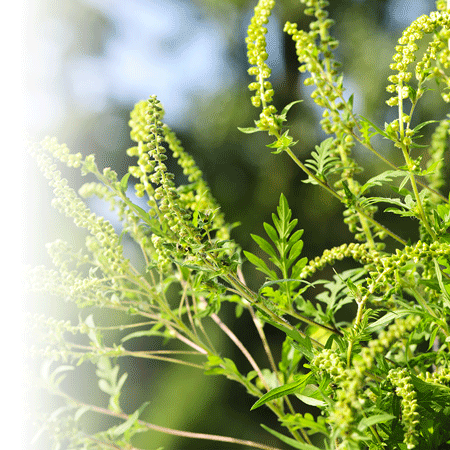Ragweed is quite a common plant. It makes life difficult for those who are allergic to it, from the end of July up until the first fall frosts.
What is ragweed?
Because the words in French resemble each other, people tend to confuse ragweed with poison-ivy. These plants are very different, but they can both cause certain health issues. The first, mostly causes respiratory problems, while the other mainly affects the skin.
The pollen from ragweed causes an allergic reaction, commonly called hay fever, in thousands of Canadians during the summertime. Because ragweed is often found on the roadside or vacant lots, going for a walk outdoors or for a car ride can be a nightmare for people with allergies.
Contrary to poison-ivy, ragweed is not dangerous to the touch and can be weeded out with bare hands. In fact, it is advisable to weed it when its presence is detected. However, make sure it is indeed ragweed before you put your hands on it!
What are the symptoms of a ragweed allergy?
A ragweed allergy can manifest itself by various symptoms, including the following:
- nasal congestion
- runny nose
- sneezing
- itchy eyes, nose, throat, roof of the mouth, and ears
- watery eyes, and
- coughing
These unpleasant symptoms can significantly affect quality of life. In some cases, it may become difficult to carry on everyday activities. Sometimes, other related problems appear such as insomnia, irritability, difficulty concentrating, worsened asthma, or infection, such as sinusitis.
How can you reduce the symptoms of a ragweed allergy?
People who are allergic should limit their exposure to pollen by avoiding ragweed infested areas. In fact, it is recommended to weed the plant, especially in areas that are difficult to avoid, such as the backyard. Here are a few other useful ways to limit the unpleasant effects caused by ragweed:
- Eliminate ragweed before summer arrives.
- Wear glasses to reduce the amount of pollen that gets into the eyes.
- Avoid line-drying your clothes outdoors—pollen sticks to fabric.
- Remove your clothing if you think it may be covered with pollen when you come back into the house.
- When you come home, shower and change your clothes because pollen can stick to fabric, skin and hair.
- Keep windows shut (in the car, house, at work, etc.). Use a fan or air conditioner whenever possible.
- Avoid going outdoors in the morning or when the air is dry, hot or windy. It’s better to practise your outdoor activities when pollen levels are low, for example, in late afternoon or after heavy rain.
- Wear a dust mask when you garden or mow the lawn.
- Find out what the pollen count forecasts are and avoid going out when they are very high.
What are the treatments against ragweed allergy symptoms?
First, let's clarify that a person with a ragweed allergy can’t be cured, the allergy can’t be permanently eliminated. The immune system perceives pollen from the plant as a “threat” for the body, which triggers allergy symptoms. However, some treatments may reduce symptoms.
The medications most often used to ease seasonal allergy symptoms are antihistamines, also called “antiallergic drugs”. Several of them are available at the pharmacy without a prescription. They come in different formats—tablets, capsules, syrup, eye drops, etc. The ones taken by mouth are sometimes combined with another drug, such as a nasal decongestant. As is the case for any over-the-counter medication, you should speak to your pharmacist before purchasing an antiallergic drug.
Using an over-the-counter antiallergic drug is often enough to make the allergy season less unpleasant. Using a saline solution to clean nasal passages can also be beneficial. However, in some cases, these measures may remain ineffective. If this occurs, speak to your pharmacist or doctor about it. The use of other medications could be considered, such as a cortisone nasal spray for example. In the most severe cases, a desensitization treatment (immunotherapy) may be considered.
Speak to your pharmacist for additional information about ragweed allergies and treatments.

